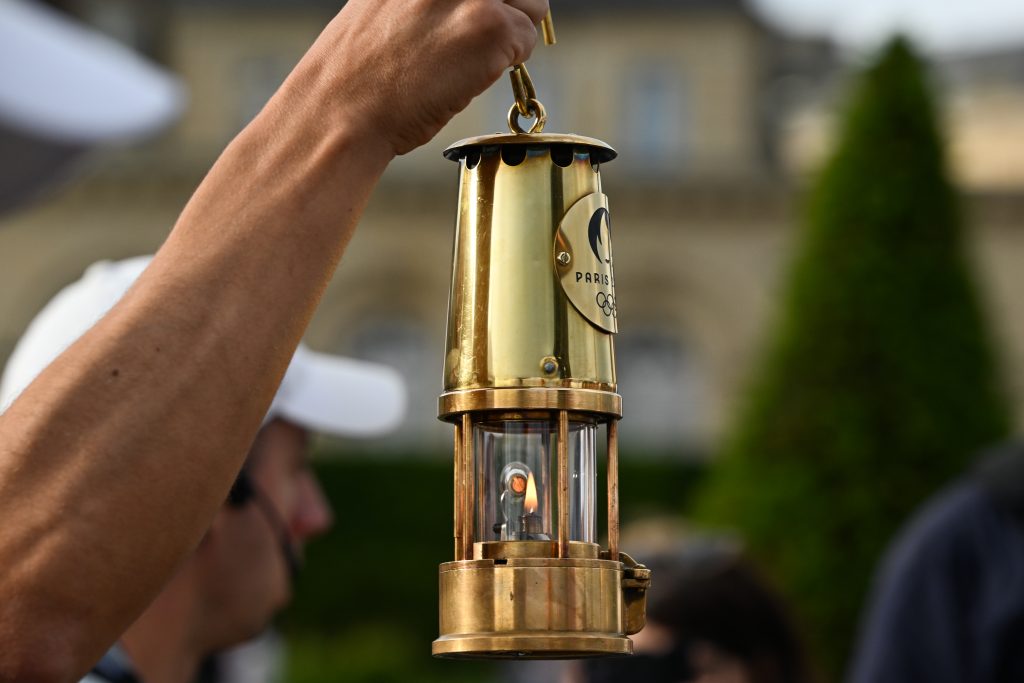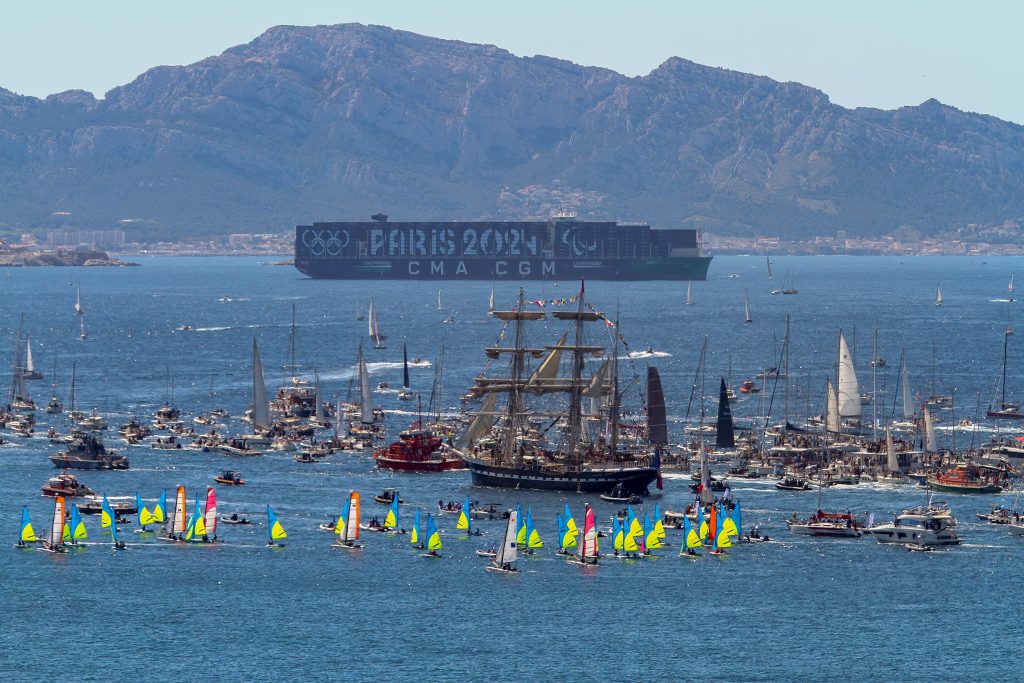Nineteen days of competition, 10,500 athletes, and 35 venues are just some of the impressive Paris 2024 Summer Olympic Games stats. Around 45,000 volunteers are helping to make this prestigious event happen, along with sponsors and funders, including some co-ops.
Groupe BPCE – with its brands Banque Populaire, Caisse d’Epargne, Banque Palatine and Natixis – was the first group to join the Paris 2024 national partnership programme. It also sponsors 10 individual athletes along with France’s national surfing, sailing, basketball and handball teams.
Many co-ops are also providing technical expertise or delivering essential products and services. For example, La Scop Etamine, a design and consultancy co-op, was involved in the construction of six Olympic structures. La Scop Etamine defined the environmental performance indicators (EPI) of the Paris Olympic Aquatic Center. A “low carbon” building, the centre integrates bio-sourced materials and presents technical innovations (mobile docks, high-performance filtration, continuous trichloramine measurement, maximum heat and water recovery). The co-op also carried out feasibility studies and helped implement the environmental strategy for the athletes’ village.
Related: Social and solidarity economy actors seen as key to building a circular economy in France
Another co-op involved in building the Olympic venues is La Scop Scoping, a civil engineering and construction consultancy firm. The co-op helped with the energy renovation of the Poissonniers sports hall and the Eaubonne sports complex (CDFAS), as well as in the construction of the athletes’ village on Île-Saint-Denis. It used bioclimatic architecture in its implementation, matching the design of buildings to the needs of the local climate, ensuring thermal comfort using environmental resources. It used a clear roof and natural ventilation to combat summer overheating at the CDFAS and favoured the reuse of materials for the Poissonniers sports hall. For the athletes’ village, the co-op focused on ensuring the building can be repurposed.
As such, the athletes’ housing facilities will be converted into family housing after the Games.
Meanwhile, Marseille-based Atelier Aïno, an architecture and material design agency, was involved in the Arena Porte de la Chapelle project in Paris, supporting the design studies to adapt the earth structure to the demanding equipment.

Similarly, Atelier Reeb, a worker co-op specialising in plant-based purification, assisted in designing a system for recycling shower water from a fire station in Saint-Denis. The implementation of this purification system is carried out within an experimental framework, with an exemption from the Regional Health Agency.
“The expertise of SCOP (worker co-ops) in the construction field represents a real asset for carrying out these Olympic works which require new or little-used solutions,” said Fatima Bellaredj, general delegate of Les Scop, the French federation of worker and multi-stakeholder co-ops, in a press release.
“By combining technical expertise and a co-operative model, the SCOPs bring a human and sustainable dimension to these emblematic projects, thus helping to build a positive legacy for future generations.”
Infrastructure projects
Financial co-op Groupe BPCE has helped fund major infrastructure projects in France, such as the Maison du Handball flagship facility in Créteil in the suburbs of Paris, the Paris La Défense Arena, and the Olympic Village in St Denis in northern Paris. A premium partner of the Games, Groupe BPCE is the second-largest banking group in France, with 105,000 employees and 36 million customers worldwide.
Its sponsorship of the Games is particularly important because the partnership programme envisaged by Paris 2024 aims to ensure around a third of the financing of the budget for organising the games.
Related: Top 100 co-ops in France have a joint turnover of €286bn
The group operates in the retail banking and insurance sectors in France via brands like the Banque Populaire, Caisse d’Epargne and Banque Palatine, all of which have mobilised to make the games a success, including by sponsoring the torch relay.
Caisse d’Epargne has also committed to creating or renovating more than 100 sports fields throughout France. To mark the torch relay, each Caisse d’Epargne regional savings bank has also built a basketball hoop system within its territory to encourage residents to take up the sport.
Throughout the Olympic flame’s journey, the Banques Populaires and regional Caisses d’Epargne hired 1,000 new permanent employees for commercial adviser roles. This was done via interviews conducted while engaging in sports activities.

The Olympic Torch
Over its 69-day journey that started on 16 April 2024 in Olympia, Greece, the Olympic torch passed through more than 400 cities in 65 territories, where the 12 regional Banque Populaire banks highlighted those who contribute to promoting their territories.
The flame first crossed the Mediterranean on board the Belem, a three-masted ship owned by the Caisse d’Epargne Belem Foundation. It then made its way across the Atlantic, Indian and Pacific Oceans as part of an oceans relay to reach six overseas territories: Guadeloupe, Guyana, Martinique, French Polynesia, New Caledonia and Reunion Island. The flame crossed the Atlantic on board the Maxi Banque Populaire XI – a boat powered by wind, a first in the history of the Olympic torch.
Co-ops played a key role in making this journey happen and they were also involved in selecting torch bearers. Banque Populaire selected or drew at random 450 bearers of the torch from its customers, members, employees and the general public. In addition to the individual supporters, each of the 12 regional Banque Populaire banks also organised a collective Relay made up of 24 people to promote their brand’s strong commitments, including DEI and LGPTQ+.
“Caisse d’Epargne is extremely proud to be the official sponsor of the Paris 2024 Olympic and Paralympic torch relays,” said Jacques-Olivier Hurbal, Caisse d’Epargne’s development director, in a statement. “As a regional co-operative bank, it was essential for us to share the flame and the magic of the games in all territories for our customers, our members, our employees and the general public.
“This major meeting will thus be an opportunity to honour the women and men behind initiatives that are particularly useful to others or to their region: as bearers of the flame, they will also be ambassadors of these values of commitment, co-operation and solidarity which are so dear to our hearts.”
At the end of each daily journey, the flame was transported to a stop-over location to give the public the chance to photograph themselves as a crew with the torch on the deck of the boat and learn more about preserving marine environments.
“Banque Populaire is pleased to be involved in the Olympic and Paralympic torch relays and to share this historic event with all French people in the territories,” said Pierre-Laurent Berne, Banque Populaire’s director of development. “This meeting will be an opportunity to highlight those who make our regions proud, to celebrate the spirit of sport and to continue our commitment to the preservation of aquatic environments. As a sailing bank for over 35 years, we are particularly proud that the Olympic flame is entrusted to Armel Le Cléac’h and the members of the successful crew, for
an unprecedented transatlantic crossing aboard the Maxi Banque Populaire XI from Brest to the West Indies. We look forward to experiencing these unforgettable moments in the 65 territories covered in the 12 regional Banque Populaire banks.”
The SSE sector
According to the French government, more than 500 social and solidarity economy (SSE) actors have mobilised to make the games a social and environmental success.
The ministry says around 25% of Olympic contracts were awarded to 500 SSE or local economy companies in various sectors, including construction, catering, furniture, laundry, landscaping, consulting, HR and general services. Examples include co-ops that will be providing food for the media village.
“These games will not just be a festive success,” said Olivia Grégoire, minister delegate in charge of business, tourism and consumption.
“The actors of the SSE once again demonstrate their great capacity to contribute to the economy of our country thanks to their essential projects which respond on the one hand to important social issues – such as professional integration – and other to the imperatives of sustainability both on large urban planning projects and in artisanal design projects.”

